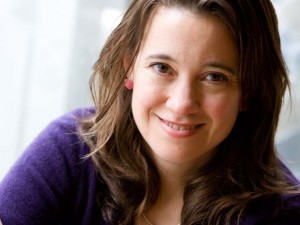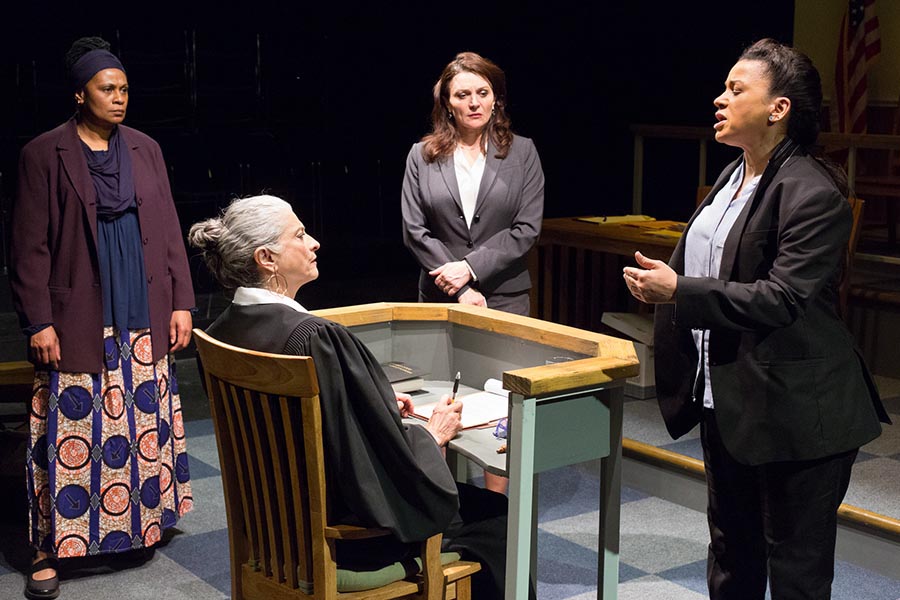Last year, more than 5,000 cases of sex trafficking were reported in the United States. When she started research for her newest play, Project Dawn—currently at People’s Light & Theatre in Malvern, Pa., through July 9—Karen Hartman was determined to put human faces on that statistic. “I was interested in human trafficking because of the parallel to slavery,” says Hartman, whose other plays include Gum and Roz and Ray. “Prostitution divides the left, and those are my favorite moral issues: real gray area.”
The first part of her research was interviewing the founders of Dawn’s Place in Philadelphia, a halfway house for women who have been trafficked, prostituted, or pimped. One of the founders, a lawyer named Mary DeFusco, suggested that Hartman sit in on Project Dawn Court, which she also founded. The court was created in 2010 for women with a history of prostitution and drug offenses. Instead of sending them to jail (in Pennsylvania, prostitution carries a sentence of up to five years), Project Dawn promised to erase the women’s charges in exchange for successful completion of a year-long rehabilitation program.
Hartman immediately saw a play in these proceedings. Project Dawn looks at the court from the perspectives of the judge, probation officer, assistant district attorney, public defenders, and of course the defendants. Though some were forced into it, others chose prostitution because of poverty. Hartman says the latter is called “commercial sex exploitation,” which “bridges a gap between the legal definition of trafficking and the functional lack of choice facing most street prostitutes.”
The play was developed as part of People’s Light’s New Play Frontiers program, which commissions playwrights to write plays based on their interactions with the local community. The program includes a 21-day residency in Malvern. The program was inspired, says People’s Light producing director Zak Berkman, by the creation process for Nilaja Sun’s No Child…, which Berkman helped oversee as co-leader of the New York City-based Epic Theatre Ensemble, where Sun’s piece about inner-city high schoolers was developed. Berkman says New Play Frontiers “aims to cultivate community investment among diverse local populations in tandem with the conception, development, and production of new plays inspired by stories from our Philadelphia region, with national resonance.”*
Hartman spoke over the phone about why she decided to tackle Project Dawn, which will next be produced at Horizon Theatre Company in Atlanta, Sept. 22-Oct. 29, 2017, and Unicorn Theatre in Kansas City, Mo., Jan. 24-Feb. 18, 2018.
DANIELLE GERMAIN: Talk to me about your background and why you were interested in the New Play Frontiers program.
KAREN HARTMAN: Zak Berkman’s invitation to apply for New Play Frontiers came right when I craved more reality. I think anyone who works in the theatre struggles with the question of relevance. It can become quite rarefied, especially if you’re relatively fortunate to make your way mostly in the theatre rather than mostly working day jobs—when your experiential world can become an increasingly closed loop.
This conversation opened the loop, as well as Superstorm Sandy, which happened a few months before I got that invitation from People’s Light. To walk around Manhattan in the dark, with no lights on, to be suddenly in the Middle Ages—I led a writing workshop by candlelight, I was carrying coffee from Brooklyn because there was no where to buy coffee in Chelsea. This social skin we have is so fragile, just so thin—like it’s one storm away. This just prompted my sense of urgency and wanting to get in and dig into the world a bit more. That was where I was emotionally. It was just a shift in ambition.
When I heard about this People’s Light project, that would forge plays in their communities that would ultimately see them, the possibility of joining a theatrical project rooted in actual other human beings seemed exactly, desperately right.

What went into your decision to focus on sex trafficking?
I understood (mistakenly) that the first round of projects would focus on the Underground Railroad. I landed on the idea of a safe house, where a person goes to transition from being property to being an independent human. I wanted to look at such a place of refuge and transformation in a contemporary context. Pennsylvania, an early leader in abolitionism and a battleground for the Fugitive Slave Act, is now a hot spot for drug and sex trafficking, partly for the same reason—its central location on the Eastern Corridor (I-95 is as critical now as the Delaware River 200 years ago).
I was thinking about, what is a place that is created deliberately for human beings who have been included in the most egregious (in terms of numbers) genocide in history? To go to a place where they are going to literally, legally, but also emotionally and internally shift from being property to people again? These are people who have been born into slavery. Then I found out that human trafficking is happening now, on an even larger scale than what we’re aware of.
Talk to me about your experience at Project Dawn Court.
I interviewed the founders of Dawn’s Place, four nuns and a lawyer, Mary DeFusco. Mary suggested I sit in on the court she had also founded, for women with prostitution convictions but no other crimes. Two weeks later I slipped into that court, was introduced very briefly by Mary, and took notes but didn’t record. In Project Dawn Court I found ritual, action, stakes, and humanity. That was the play. I kept coming back, a fly on the wall for these monthly sessions, which are long, and both formulaic and intense. Each of the 50 or so women stands up to give her report; some are brief and some highly emotional. Some celebrate milestones of success or recovery; some get sentenced to jail from the courtroom. I got to be friends with some of the staff members. I love these women. I wish I were more like them. They are warriors with wicked humor.
On the other hand, their court is controversial, because the women must plead guilty in order to participate, so there is a question of people giving up civil liberties without understanding the possible consequences. So I worship these staff members but don’t always agree with them. For the staff of Project Dawn Court, who labors pretty unseen, on zero budget, on behalf of women who are even more unseen and totally impoverished, there was a kind of light in the room. They already knew the sad parts of the story: the grim outcomes, the suffering. I dosed the script with as much humor as possible, and I think I constructed the staff as I see them, which is as heroes. Project Dawn Court was the room that I needed.

Do you think that this play will ignite real change, not only your community, but in state and local leadership?
Yes, I think this was the first step. I want to get people talking. The conversation after Project Dawn was so different from the usual post-play discussion, not only among the staff who were present but the rest of the People’s Light audience too. They wanted to speak about the issues raised by the piece, not so much about what “worked” or didn’t. I liked the moral outrage and the shared understanding that this is happening, not necessarily on “our” doorstep—remember it’s a suburban theatre—but in our county, under our state and local leadership.
How has this project changed you, as a playwright and as a person?
Honestly this production was a challenge as a playwright, but it gave me power as a person. My hope is to pull an audience in through a portal of these nonprofit workers, who are admirable. I’m trying to confront the humanity of individuals who are overlooked. I want to find out what kind of society allows this to happen. This play is a major technical and emotional challenge that I see not only in myself but in the actors as well. Our brains work so effectively to slot information into pre-fabricated categories. Art should push back on that, make new categories, but unfortunately those stereotypes are lodged inside artists too. Observing the shapes and patterns of actual other lives has expanded my emotional circuitry, and I hope enabled my work to be a little more useful.
I know I can do anything. Every time I take on something that’s larger than what I did before. The drive that I have for change led me to take on this kind of story.
*An earlier version of this story misrepresented the aim of the New Play Frontiers Program. We’ve added a clarifying quote.


